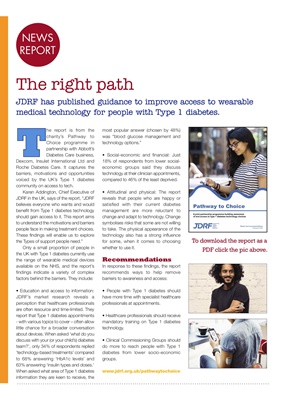
NEWS
JDRF has published guidance to improve access to wearable
medical technology for people with Type 1 diabetes.
The right path
T
he report is from the
charity's Pathway to
Choice programme in
partnership with Abbott's
Diabetes Care business,
Dexcom, Insulet International Ltd and
Roche Diabetes Care. It captures the
barriers, motivations and opportunities
voiced by the UK's Type 1 diabetes
community on access to tech.
Karen Addington, Chief Executive of
JDRF in the UK, says of the report, "JDRF
believes everyone who wants and would
benefit from Type 1 diabetes technology
should gain access to it. This report aims
to understand the motivations and barriers
people face in making treatment choices.
These findings will enable us to explore
the Types of support people need."
Only a small proportion of people in
the UK with Type 1 diabetes currently use
the range of wearable medical devices
available on the NHS, and the report's
findings indicate a variety of complex
factors behind the barriers. They include:
• Education and access to information:
JDRF's market research reveals a
perception that healthcare professionals
are often resource and time-limited. They
report that Type 1 diabetes appointments
- with various topics to cover - often allow
little chance for a broader conversation
about devices. When asked 'what do you
discuss with your (or your child's) diabetes
team?', only 34% of respondents replied
'technology-based treatments' compared
to 68% answering 'HbA1c levels' and
63% answering 'insulin types and doses.'
When asked what area of Type 1 diabetes
information they are keen to receive, the
NEWS
REPORT
most popular answer (chosen by 48%)
was "blood glucose management and
technology options."
• Social-economic and financial: Just
18% of respondents from lower socialeconomic groups
said they discuss
technology at their clinician appointments,
compared to 46% of the least deprived.
• Attitudinal and physical: The report
reveals that people who are happy or
satisfied with their current diabetes
management are more reluctant to
change and adapt to technology. Change
symbolises risks that some are not willing
to take. The physical appearance of the
technology also has a strong influence
for some, when it comes to choosing
whether to use it.
Recommendations
In response to these findings, the report
recommends ways to help remove
barriers to awareness and access:
• People with Type 1 diabetes should
have more time with specialist healthcare
professionals at appointments.
• Healthcare professionals should receive
mandatory training on Type 1 diabetes
technology.
• Clinical Commissioning Groups should
do more to reach people with Type 1
diabetes from lower socio-economic
groups.
www.jdrf.org.uk/pathwaytochoice
To download the report as a
PDF click the pic above.